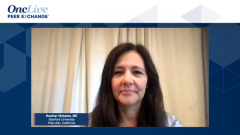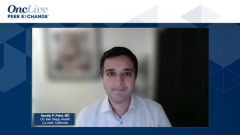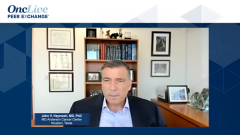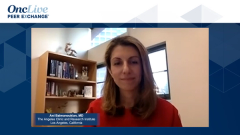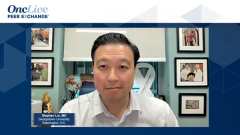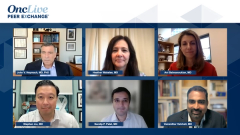
IMpower133 Trial for Extensive-Stage SCLC
Stephen Liu, MD, reviews outcomes from the IMpower133 trial and comments on the current standard of care for the first-line treatment of extensive-stage SCLC.
Episodes in this series

John V. Heymach, MD, PhD: For extensive stage, we’ve had 2 major positive studies that have changed the standard of care and there are still a lot of analyses going on with those. Stephen, you’ve been deeply involved with the IMpower133 study. Do you want to give us an update on what’s happening there?
Stephen Liu, MD: Sure. IMpower133 was a randomized, double-blind, placebo-controlled phase 3 trial for patients with treatment-naїve extensive-stage small cell. Over 400 patients received standard carboplatin and etoposide for 4 cycles and were randomized 1:1 to receive concurrent and maintenance atezolizumab or placebo. What we saw from that study first presented in 2018 was that adding atezolizumab improved progression-free survival and, importantly, improved overall survival [OS]. Updated analyses in 2021 showed a hazard ratio of 0.76. The 18-month OS rate improved from 21% to 34%. Atezolizumab was approved for small cell lung cancer in March 2019 by the FDA and established a new standard of care. It was the first study in dozens of years to show any improvement in survival.
It’s clear that the benefit is somewhat modest. I certainly agree that this is our standard of care, but this isn’t necessarily as good as we had hoped. It’s certainly better than what we had, but it’s clear to most of us that a subset of patients are carrying most of this benefit, so now the challenge is identifying those patients. As we all know, biomarker work in small cell is very challenging. What we know is that PD-L1 expression and tumor mutational burden don’t seem to be the best predictive markers regardless of what assay you use, what cutoff you use, whether you’re above or below. All patients seem to benefit from atezolizumab.
Also, most of the interest lately has been on subsets defined by the expression of certain transcriptional regulators. Work done by Drs Charlie Rudin, yourself, Dr Heymach, Lauren Byers, and Carl Gay identifies different biologic subsets based on the expression of these regulators. We’re still refining these subtypes, but the most recent categories would be expression of ASCL1, NEUROD1, PAU2F3, and an inflamed subtype in the most recent analysis.
Looking at the IMpower133 data, we do see long-term survivors in all these subsets. They’re not confined to 1 subset. The inflamed subset does seem to be enriched for long-term survivors. Long-term survivors also had elevated expression of certain markers of T-cell and B-cell infiltration and function. These specific subsets may be prognostic in some regard. There may be an enrichment for immunotherapy benefit in that inflamed subset, but we need our prospective studies to help define that. We have to address some other challenging things. How do we address the heterogeneity of these subsets, the plasticity of these subsets. This is going to be tough, but it’s worthwhile, and we’re well on our way.
John V. Heymach, MD, PhD: You’re right. You pointed out some of the promise and challenges; we’ve always had 1 entity of small cell lung cancer clinically, and now we have hope that maybe we can divide it into subgroups that respond differently to different treatments. But you pointed out the challenge of resistance. We’re observing that tumors can sometimes switch subtypes or become more heterogeneous. This isn’t going to be simple, but at least we’ve got a foot in the door, we hope, about these different subgroups. And the IMpower133 has been really important in helping us take that step forward.
Transcript Edited for Clarity


